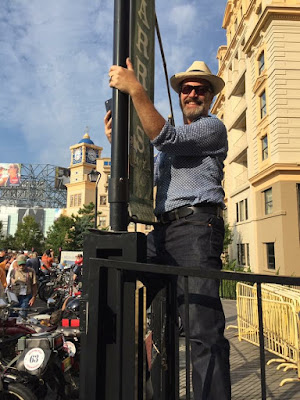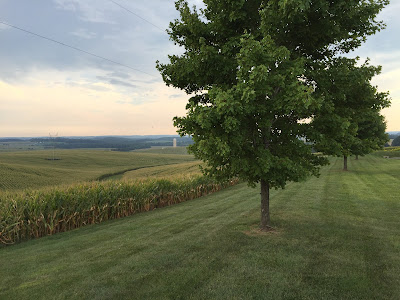CANNONBALLS DEEP: THE BEGINNING -,
I am often asked "what's the best car?" My answer varies greatly, but over the past two decades in the automotive industry, I have come to the conclusion that European cars are superior. This does not mean I do not appreciate some Asian or American cars, but they do not compare with European car thrills techniques. American and Asian cars lose something that I think is more of a quality than a European car. this time we will discuss aboutCANNONBALLS DEEP: THE BEGINNINGLets me talk it
 |
| Shinya Kimura on his 1915 Indian twin, on a test run before its 4th Cannonball, as seen from the back of our 'wet plate van', my Sprinter with red 'safety' film on the window for our mobile darkroom. |
It was history to be made, and 93 riders grasped the gauntlet; to be the first 100-year old vehicles of any sort to cross the United States. Cars, planes, bicycles, rollers skates, whatever - the 2016
Motorcycle Cannonball Endurance Rally, this year called the Race of the Century, would the be the first attempt to my knowledge for any Centurion vehicle to cross the country in an observed trial. That claim was staked at the starter's banquet in the
Golden Nugget hotel on September 9th in
Atlantic City, New Jersey, during an oppressively hot and muggy late Summer week - 95 degrees and 90% humidity - the hotel having chiseled off it's 'Trump' name some years ago during a bankruptcy proceeding.
 |
| Trying to get a decent shot of the assembled 94 motorcycles on the Atlantic City boardwalk, just before the 10am start of the Cannonball. |
It wasn't the only evidence of Trump, or bankruptcy, we'd encounter on our third trip over backroads America. Three Cannonballs, this one likely to be my last, and for once totally bikeless, as my partner (with the bike) couldn't take the 3 weeks off this year. My artistic and life partner Susan, after a crisis huddle, decided our
MotoTintype project was too important to abandon, so we chose to follow the Cannonball as photographers, taking as many 'wet plate' photos as we could, and round out the hundreds of images we'd already shot on the prior 2 events, in order to make a book of the best images. Susan's brother Scott drove my Sprinter to NYC, and thus began another epic road trip.
 |
| ...and the shot I was able to take, from the opposite direction from the official panorama of the start. |
The Motorcycle Cannonball was initiated by Lonnie Isam Jr, as both an homage to the achievement of Erwin 'Cannonball' Baker's cross-country record breaking sprees in the early part of the 20th Century, and a challenge to the many owners of early motorcycles who didn't ride them all that much. Lonnie believed early machines were just as capable of crossing the country today - on paved roads rather than dirt tracks - as they were when new, and the
first Cannonball was held in 2010, with a small cadre of riders on pre-1916 machines accepting the challenge. That first year was notoriously difficult, and an admirably bonding experience. Nobody had tried such an incredibly long ride - 3500 miles - on such old machinery, and nobody really knew what to expect, or how the bikes would hold up to riding and average 250 miles/day on a rigorous schedule.
 |
| Kurt Klokkenga, one of the 'motorcycle sweep' staff of the Cannonball, who were allowed to help repair machines en route without penalty. I'm sure many stranded riders were grateful of their help! Love his patina Panhead. |
Not surprisingly, the tales of woe and late nights spent making repairs, every single night, made that 2010 event legendary. Most of the original 45 riders vowed never to do it again, and kept their promise! Some returned in 2012 though, especially as the rules were relaxed to include bikes up to 1930. That allowed me to naively enter the 2012
Cannonball with my 1928-framed Velocette Mk4 KTT. 'The Mule' had been my reliable rally machine for 12 years, taking in 7 week-long Velocette rallies, covering 250-mile days with aplomb. I'd already effectively double the Cannonball mileage on a similar daily schedule, so it seemed a plausible effort.
 |
| Beauty among the beasts! Rider Steve DeCosa's daughters joined up (help with her name!?), and Buck Carson of Carson Classic Motors was happy to pose on the 1913 Warwick delivery tricycle ridden by his father Mike. |
Readers of my
2012 Cannonball reports on TheVintagent.com know I had terrible problems with two replacement camshafts I installed, the first lasting about 20 miles total, and the second, installed after many hours modification at a machine shop, lasted only a further 1000 miles. Those were blissful miles over the Rockies, I'll confess, but the truth was, the Cannonball defeated my preparation. The Mule remains the only overhead-camshaft motorcycle to run the Cannonball, and several H-D riders suggested that a machine which couldn't be fixed with a hammer had no place on a run like the Cannonball. Perhaps they're correct.
 |
| German engineering! Thomas Trapp and Paul Jung found the front fender of this 1915 Harley-Davidson too long, and fouling the front wheel at speed, so they bobbed it! Thomas is Europe's largest H-D dealer, from Frankfurt. |
In 2014, I partnered with
Revival Cycles to ride
Bryan Bossier's 1933 Brough Superior 1150, which proved an absolutely remarkable machine, showing its heels daily to every other Cannonball machine, and cruising at a steady 65-70mph, even ridden two-up, with Susan on the back. Our only 'competition' was the 1936 H-D Knuckleheads squeaking into the pre-1937 rules, but a day-long ride on a Knuck over the 11,000' Independence Pass in Colorado, with its endless hairpin turns, revealed there was no comparison between the pride of American engineering, and a cobbled-up masterpiece of British engineering. Sorry dudes.
(Read my 2014 ride report here)With no motorbike to concern us this year, Susan and I had an all-Sprinter Cannonball rally, and embraced the experience. Following the same route as the riders, we were blessed with the endlessly beautiful and fascinating landscape of the United States. The natural beauty of the East Coast forests, with their winding hills and hollows, lovely climbs were perfect motorcycle roads, dotted regularly with podunk villages and oddball eateries, brought a mix of awe at Nature and concern at Nurture. Signs supporting a blustering demagogue were inevitably mixed with Confederate flags in Pennsylvania, a clear repudiation of both the policies and race of our current president, in parts of the country left far behind the technology-based prosperity of my native California.
The start of this year's rally was hot and oppressive, with daily 95deg temps and 90% humidity. Jumping in an out of the Sprinter to develop photographs was an experience in hydration management, a subject which became increasingly critical as the days rolled forward, regardless of our 'ride nurse' Vicki 'Spitfire' Sanfelipo handing out electrolite tablets like candy. Make friends with Gatorade, she said, so we did, and wrung out our sweat-soaked clothing at night (I'll cover our wet plate adventure in a separate post).
 |
| Cris Sommer Simmons has ridden 'Effie', her 1915 Harley-Davidson, on 2 Cannonballs now, and it acquitted itself very well. |
September 10th was a short ride of 158 miles through an endless series of New Jersey stoplights. The heat, and the constant stop-start, took a heavy toll on machinery and riders, and by the end of the day in York, Pennsylvania, 23 machines were hors de combat. Some refused to start in the heat, some broke parts, some seized, and one burned to the ground. John Pfeifer had built an extra-capacity fuel tank for his 1916 Harley-Davidson, and the weight of a full tank pressed down onto the rear cylinder's rocker arm (atop the cylinder head on an F-head motor). It only took 80 miles or so for the rocker to wear through the metal, fuel to spill onto the magneto, and a great ball of flame to erupt. John watched his machine burn for 20 minutes before a fire truck arrived with a decent extinguisher. The first day was the worst day overall, culling the field quickly, and serving notice this wasn't going to be an easy run.
 |
| Our wet plate of Brent Hansen and his 1913 Shaw motor bicycle, with a very long road before him. |
On a bright note, Susan and I had a terrific meal at the
Left Bank in York, the first of 3 excellent meals on our 17-day trip. We tried our hardest to eat well, searching daily for the 'best restaurant in X', and finding lists online which invariably included chains like Jack in the Box. It's not difficult to draw conclusions about rural American culinary habits from this, and you'd be correct - America grows food for the world, but eats poorly in the very regions that food is grown. But we'd discovered that a couple of times already, and brought a sufficient stock of coffee and wine from home!
 |
| A visit from the locals! Atlantic city crew - the neighborhood '12 O'Clock Boys', although they sheepishly admitted they were 1 or 2 O'Clockers in reality, as a fully vertical wheelie is hard! |
 |
| Rural Pennsylvania is a lovely place to ride through. We stopped in Collinsville, PA, for some ice cream |
 |
| Day 1: carnage. The cylinder head on Dave Volnek's 1915 Indian blew out, but he had spares, and the bike was back on the road the next day. |
 |
| Part of a strong German contingent, Andreas Kaindl rode his 1915 Henderson single-speeder, which he purchased from the Hockenheim Museum, and added a convincing faux-patina paint job. This was Andy's 2nd Cannonball. |
 |
| Frank Westfall on his 1912 Henderson, and Buck Carson on his 1914 BSA single belt-driver. |
 |
| Trouble begins before the beginning! The 1913 Douglas of Steve Alexander gets a flat in the first 6 miles, at the staging area... |
 |
| Doug Feinsod, a Cannonball veteran, and one of the 'Thor Losers', a 5-rider team of rare Thor v-twins |
 |
| Many kind words and thoughts were directed to our friend Bill Buckingham, who was tragically killed 2 weeks before the Cannonball. His usual #40 number plate was carried by a string of other riders, and '40' stickers adorned many bikes. Godspeed, Bill |
CANNONBALLS DEEP: THE BEGINNING
4/
5
Oleh
joe samuel



















